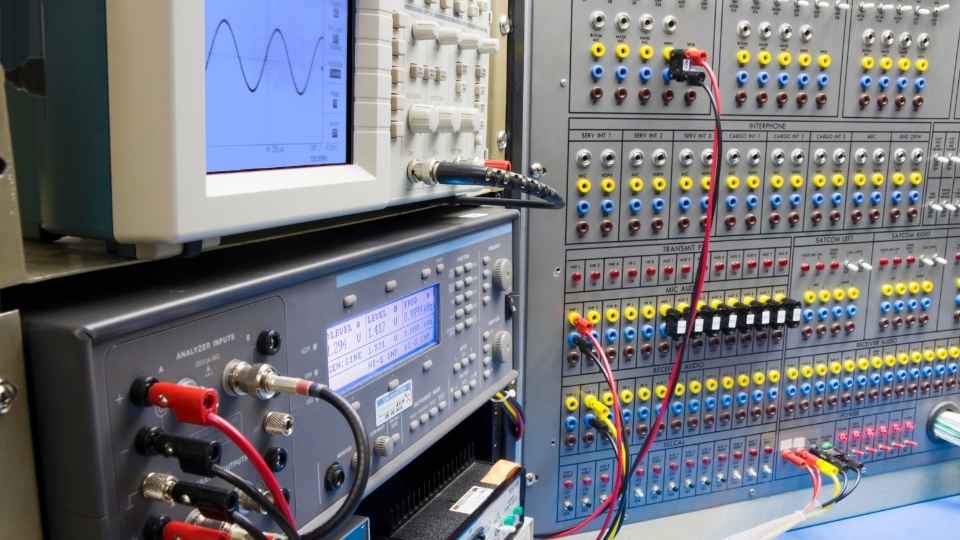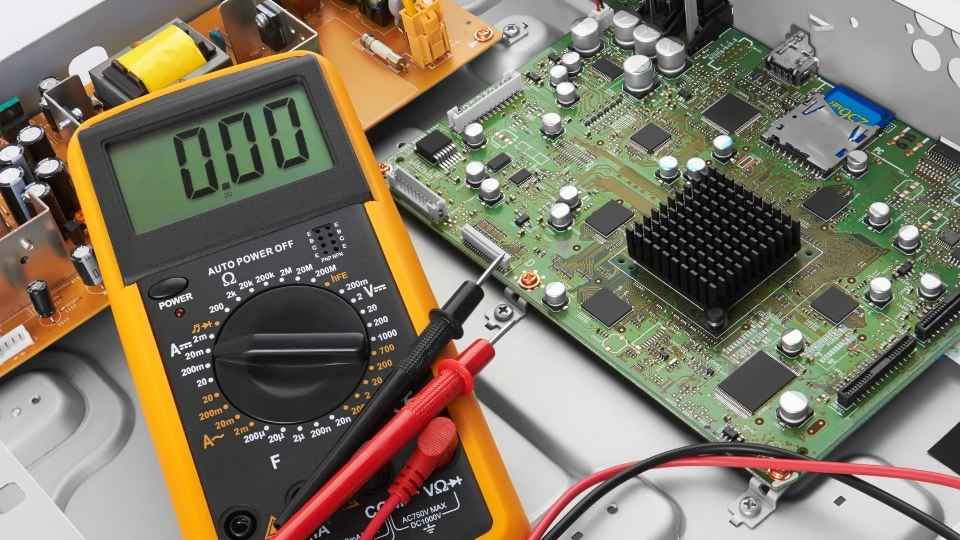
In the ever-evolving landscape of technology, one concept has captured the imagination of scientists and researchers alike: quantum computing. As we venture into uncharted territories, an electronics research scientist emerges as a symbol of progress, pushing the boundaries of what is possible in this revolutionary field.
This article delves into the current state of quantum computing, exploring advancements in hardware, quantum algorithms and applications, as well as the challenges and limitations that lie ahead.
Join us on this journey to uncover what's next in the quantum computing revolution.
Key Takeaways
- Advancements in quantum computing hardware are being pursued, with a focus on improving qubit coherence and reducing error rates.
- Breakthroughs in materials science, circuit design, and fabrication techniques are paving the way for future hardware developments.
- Quantum algorithms are expanding the range of problems that quantum computers can efficiently tackle, including cryptography, optimization, and drug discovery.
- Quantum computing has the potential to revolutionize various industries, including finance, healthcare, logistics, and materials science.
The Current State of Quantum Computing
and the potential to revolutionize various industries, quantum computing is at an exciting stage with numerous advancements and breakthroughs in the field. Researchers and scientists are making significant progress in understanding and harnessing the power of quantum mechanics to create more powerful computers.
Quantum computing utilizes qubits, the basic units of information, which can exist in multiple states simultaneously. This allows for parallel processing and exponential computational power. As a result, industries such as cryptography, drug discovery, optimization problems, and artificial intelligence could be revolutionized by this technology.
However, one of the main challenges faced in quantum computing is maintaining coherence and reducing error rates due to environmental interference. Despite this challenge, advancements in quantum computing hardware are being pursued. Improved qubit design, error correction techniques, and scalable architectures are being developed to overcome these limitations. These advancements are paving the way for practical applications of this revolutionary technology.
Overall, with ongoing advancements in quantum computing hardware and the potential to revolutionize various industries, the future of quantum computing looks promising.

Advancements in Quantum Computing Hardware
Advancements in quantum computing hardware have been a focal point of ongoing research and development efforts.
These advancements aim to overcome the challenges associated with scaling up quantum systems, improving qubit coherence, and reducing error rates.
Breakthroughs in materials science, circuit design, and fabrication techniques are paving the way for future hardware developments that hold promise for achieving more powerful and reliable quantum computers.
Quantum Computing Breakthroughs
One of the most significant milestones in quantum computing has been the recent breakthroughs that have propelled this field towards unparalleled advancements. These breakthroughs have opened up new possibilities and brought us closer to achieving practical quantum computers.
Here are three key developments that have contributed to this progress:
Quantum supremacy: In 2019, Google's quantum computer demonstrated its ability to solve a complex problem exponentially faster than any classical computer, marking a major milestone known as quantum supremacy.
Error correction: Researchers have made significant strides in developing error-correcting codes for qubits, which are crucial for building reliable and scalable quantum computers. These codes can protect against noise and errors that commonly occur in quantum systems.

Quantum algorithms: The discovery of new algorithms specifically designed for quantum computers has expanded the range of problems that these machines can tackle efficiently, including optimization, cryptography, and simulation.
These breakthroughs lay the foundation for future hardware developments in quantum computing.
Future Hardware Developments
The ongoing progress in the field of quantum computing has paved the way for substantial advancements in hardware development, leading to promising prospects for future computational capabilities. As researchers and scientists continue to push the boundaries of quantum technology, several key areas have emerged as focal points of innovation in hardware design.
One significant area of development is the improvement and scaling up of qubits, which are the basic units of information in a quantum computer. Tremendous efforts are being made to increase qubit coherence times and reduce error rates through various techniques such as error correction codes and improved fabrication processes.
Another important aspect is the development of more efficient and reliable control systems that can manipulate qubits with precision. This involves advancements in cryogenic engineering, where lower temperatures are required for proper functioning of quantum processors.
Furthermore, there is a growing emphasis on developing novel architectures that can support larger numbers of qubits and enable faster computations. These include approaches such as topological qubits, where information is protected from environmental disturbances by encoding it in non-trivial states.
Quantum Algorithms and Applications
Quantum algorithms and applications play a crucial role in harnessing the potential of quantum computing. These algorithms are designed to exploit the unique properties of quantum systems, such as superposition and entanglement, to solve complex problems more efficiently compared to classical algorithms.

Current Quantum Computing Applications
Current advancements in computing technology have led to a range of applications for quantum systems. Quantum computing, with its ability to perform complex calculations at an unprecedented speed, holds great promise for solving problems that are beyond the capabilities of classical computers.
Here are three exciting applications of quantum computing:
Cryptography: Quantum computers have the potential to break traditional encryption methods by quickly factoring large numbers. This has spurred research into developing new cryptographic algorithms that can withstand attacks from quantum computers.
Optimization: Quantum annealing algorithms can be used to solve optimization problems more efficiently than classical algorithms. This has applications in fields such as logistics, finance, and supply chain management.
Drug Discovery: The ability of quantum computers to simulate molecular interactions enables faster and more accurate drug discovery processes. By modeling the behavior of molecules and predicting their properties, researchers can identify potential drugs more efficiently.
As quantum computing continues to advance, these applications hold immense potential for revolutionizing various industries and driving innovation in computational technology.
Potential Algorithm Breakthroughs
Quantum computing has the potential to revolutionize various fields by solving complex problems that are currently intractable for classical computers. To fully harness this power, researchers are actively exploring algorithm breakthroughs that can further enhance quantum computing capabilities.

One such breakthrough is the development of quantum algorithms for optimization problems, which could significantly impact areas like logistics, finance, and supply chain management.
Another promising area of research is the design of quantum machine learning algorithms. By leveraging the unique properties of quantum systems, these algorithms have the potential to outperform classical machine learning methods in terms of speed and accuracy. This could lead to advancements in areas such as drug discovery, recommendation systems, and data analysis.
Furthermore, efforts are underway to develop cryptographic protocols that leverage quantum phenomena to provide secure communication channels resistant to hacking attempts. These breakthroughs hold immense promise for enhancing privacy and security in an increasingly digitized world.
However, despite these exciting developments, challenges and limitations remain in the field of quantum computing.
Challenges and Limitations in Quantum Computing
One of the main obstacles in advancing computing power lies in addressing the challenges and limitations that arise when working with quantum systems. Quantum computing, which harnesses the principles of quantum mechanics to perform complex calculations, offers immense potential but also presents significant hurdles.
Here are three key challenges and limitations in quantum computing:
Decoherence: Quantum systems are extremely sensitive to external interference, leading to a phenomenon known as decoherence. Maintaining coherence over extended periods is crucial for error-free computation.

Scalability: Building larger and more powerful quantum computers is difficult due to issues related to scalability. As the number of qubits increases, so does the complexity of controlling and manipulating them.
Error correction: Errors are inherent in any physical system, and quantum computers are no exception. Developing robust error correction techniques is essential for reliable computation.
Despite these challenges, ongoing research efforts aim to overcome these limitations and unlock the full potential of quantum computing in industry and research.
Quantum Computing in Industry and Research
The increasing exploration of quantum computing applications across various sectors highlights the potential for significant advancements in computational capabilities. Quantum computing has sparked interest and investment from industries such as finance, healthcare, logistics, and materials science.
In finance, quantum algorithms can improve portfolio optimization and risk analysis. In healthcare, they can accelerate drug discovery and enable personalized medicine. In logistics, they can optimize route planning and supply chain management. In materials science, they can simulate complex molecular structures to develop new materials with enhanced properties.
The integration of quantum computing into these industries is driven by the demand for faster and more efficient solutions to complex problems that are beyond the reach of classical computers. As research continues to push the boundaries of what is possible with quantum computing, exciting opportunities lie ahead for solving challenges previously thought impossible.
The Future of Quantum Computing
As we envision the future of computing, it becomes evident that quantum technology holds immense promise for transforming industries and unlocking new realms of innovation. Quantum computing is poised to revolutionize fields such as cryptography, drug discovery, optimization problems, and artificial intelligence.

Here are three key aspects that highlight the potential impact of quantum computing:
Exponential Processing Power: Quantum computers have the ability to perform complex calculations exponentially faster than classical computers by harnessing the power of qubits and superposition. This opens up possibilities for solving currently intractable problems.
Enhanced Data Security: Quantum mechanics provides a unique advantage in encryption algorithms, enabling secure communication channels and protecting sensitive data from cyber threats.
Advancements in Material Science: Quantum simulations can aid in understanding the behavior of complex materials at an atomic level, leading to breakthroughs in designing new materials with specific properties.
The future of quantum computing holds tremendous potential for scientific advancements and technological breakthroughs that will shape our world into one where previously unimaginable possibilities become reality.
Frequently Asked Questions
How Does Quantum Computing Impact the Field of Cybersecurity?
Quantum computing has a significant impact on the field of cybersecurity. Its ability to perform complex calculations at an unprecedented speed poses both challenges and opportunities in areas such as encryption, threat detection, and secure communication protocols.
Are There Any Ethical Concerns Associated With the Development and Use of Quantum Computers?
The development and use of quantum computers raise important ethical concerns. These include the potential for data breaches, privacy violations, and the impact on existing encryption methods. Proper regulation and safeguards are crucial to mitigate these risks.

How Can Quantum Computing Be Applied to Solve Complex Optimization Problems?
Quantum computing has the potential to revolutionize optimization by leveraging quantum phenomena such as superposition and entanglement. Its ability to explore multiple solutions simultaneously may lead to faster and more efficient problem-solving in fields like logistics, finance, and cryptography.
What Are the Potential Applications of Quantum Computing in the Healthcare Industry?
The potential applications of quantum computing in the healthcare industry are vast. It can revolutionize drug discovery, personalized medicine, genetic analysis, and accelerate complex simulations for disease modeling and treatment optimization, ultimately improving patient outcomes.
How Does Quantum Computing Differ From Classical Computing in Terms of Speed and Efficiency?
Quantum computing differs from classical computing in terms of speed and efficiency due to the principles of superposition and entanglement. These allow quantum computers to perform parallel computations, potentially solving complex problems exponentially faster than classical computers.
 Basic Electronics ConceptsEssential ToolsCircuit Design BasicsMicrocontrollersDIY Electronics ProjectsRoboticsPrivacy PolicyTerms And Conditions
Basic Electronics ConceptsEssential ToolsCircuit Design BasicsMicrocontrollersDIY Electronics ProjectsRoboticsPrivacy PolicyTerms And Conditions
